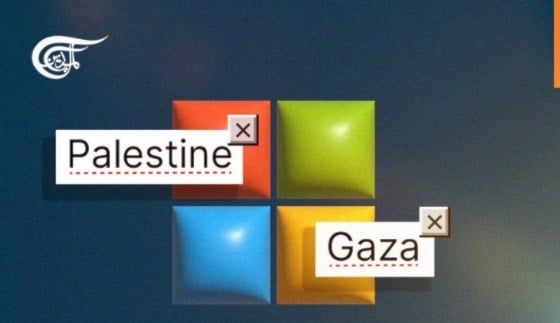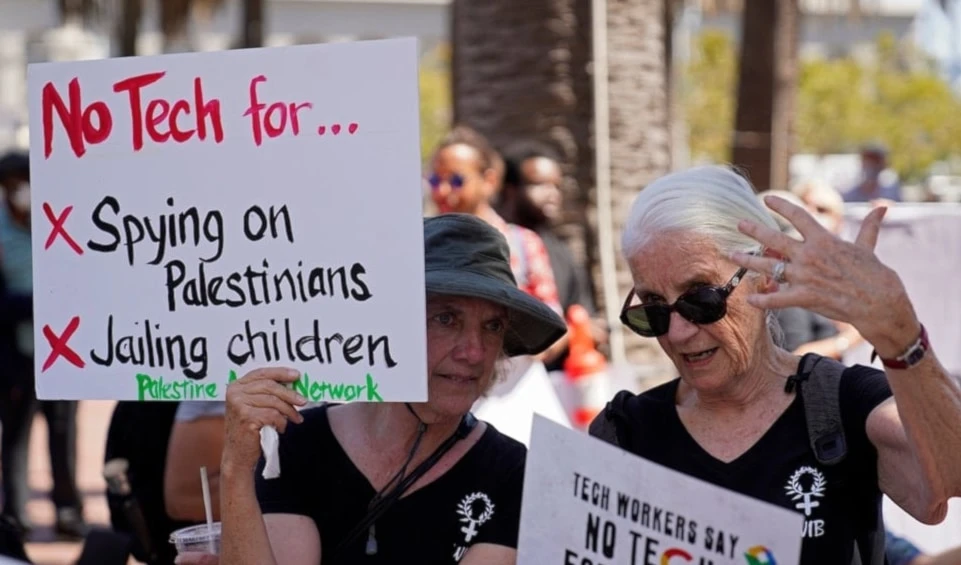Microsoft's role in world’s first AI-driven genocide, in Gaza, exposed
Microsoft’s collaboration with Israeli occupation forces raises concerns over the use of cloud technology in surveillance and warfare amid the genocide in Gaza.
-

Critics say Microsoft played a central role in what some are calling the world’s first AI-driven genocide (Al Mayadeen)
Microsoft is facing mounting criticism over its controversial complicity in "Israel’s" genocide in Gaza, with charges that its technologies have enabled surveillance, targeted assassinations, and repression of Palestinians. Critics say the company has played a central role in what some are calling the world’s first AI-driven genocide.
The charges, detailed in a report by MintPress News journalist Alan MacLeod, include the use of Microsoft’s cloud platform Azure for surveillance and so-called “kill lists", the employment of former Israeli intelligence operatives, and internal suppression of employees opposed to the company's ties with the Israeli occupation forces.
As The Associated Press reported, “among US tech firms, Microsoft has had an especially close relationship with the Israeli military,” a connection that deepened after October 7, 2023.
Following that date, the Israeli occupation's use of Microsoft Azure surged more than 200-fold. By July 2024, data stored on Microsoft servers, derived from surveillance cameras, drones, checkpoints, biometric scans, and phone intercepts, had reached 13.6 petabytes, equivalent to 23,000 years of audio or seven trillion pages of text.
Yossi Sariel, head of Unit 8200, the Israeli military’s elite surveillance division, reportedly pitched Microsoft CEO Satya Nadella in 2021 to build a segregated section of Azure for intelligence processing. The system is now reportedly connected to "Israel’s" AI-driven weapons programs. Sariel described the goal as one to “track everyone, all of the time,” using big data to monitor “a million calls an hour” in Palestine and flag targets for potential elimination.
Turning code into carnage
According to the MintPress investigation, Unit 8200 has used Azure to generate AI-assisted kill lists, scoring individuals based on proximity to known or suspected Hamas members. Once a digital threshold is crossed, individuals are added to targeting lists, often with little to no human oversight.
“Almost no one in the [Occupied] Territories is ‘clean,’ in terms of what intelligence has on them,” a former officer told MintPress.
The data have reportedly also been used to justify post-factum arrests, with innocuous statements or social media posts reframed to suggest affiliations with armed groups. One source described the system as a vast reservoir of kompromat, used to coerce Palestinians into collaboration or silence.
A senior Israeli officer referred to the cloud system as “a weapon in every sense of the word,” though others within the military expressed concern about strategic vulnerabilities due to overdependence on Microsoft technologies.
Microsoft’s response and internal dissent
Microsoft has officially denied any knowledge or involvement in unlawful surveillance, claiming, “At no time during this engagement or since that time has Microsoft been aware of the surveillance of civilians or collection of their cell phone conversations using Microsoft’s services.”
However, leaked internal reports suggest that Microsoft engineers were aware of the nature of the data being processed. One internal source remarked, “Technically, they’re not supposed to be told exactly what it is, but you don’t have to be a genius to figure it out.”
Hundreds of former Unit 8200 operatives reportedly now work for Microsoft, including in senior engineering roles.
Paul Biggar, founder of the activist group Tech For Palestine, stated, “Microsoft says that it can’t figure out if their customers are committing crimes against humanity… while at the same time Microsoft employees are working alongside uniformed IDF. Absurd!”
Deep-rooted alliance
Microsoft has had operations in "Israel" since 1989, establishing a research and development center in Herzliya in 1991. Since then, it has cultivated deep relationships with Israeli tech firms, the military, and agencies, including the Israeli Prison Service. As of 2024, Microsoft reportedly holds more than 600 active military contracts in "Israel".
Former CEO Steve Ballmer once described the company as “as much an Israeli company as an American company.” Prime Minister Benjamin Netanyahu echoed similar sentiments, calling the partnership “a marriage made in heaven.”
Suppressing dissent
Internally, employees organized under the banner No Azure for Apartheid have demanded that Microsoft:
- Cancel all Azure contracts with "Israel";
- Disclose its ties to Israeli national security bodies;
- Publicly call for a ceasefire;
- Protect whistleblowers from retaliation.
In response, Microsoft has fired staff for activism, blocked internal messages containing words like "Gaza" or "genocide", and limited access to pro-Palestine content.
Internationally, Microsoft has also been accused of interfering in accountability efforts. According to MintPress, the company reportedly blocked access to its platforms for International Criminal Court (ICC) Chief Prosecutor Karim Khan during preliminary investigations into Israeli officials.
A legacy of complicity
Observers have drawn comparisons between Microsoft’s role in Gaza and IBM’s infamous collaboration with Nazi Germany. Critics argue that Microsoft has become deeply embedded in "Israel’s" surveillance and military apparatus, a position that may have lasting ethical and legal consequences.
As MacLeod’s report concludes, Microsoft’s technology has helped fuel a campaign that many are calling the first AI-powered genocide in history, one that raises urgent questions about corporate responsibility, digital warfare, and human rights in the age of artificial intelligence.
Read next: 'Israel’s Digital Iron Dome: Weaponizing the web against Palestine

 5 Min Read
5 Min Read










